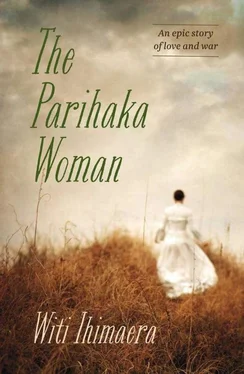‘Those who are bent by the wind’ — Tariana Turia, co-leader of the Maori Party, quoted this saying of Te Whiti’s on 18 November 2003, on the occasion of the second reading of the Ngati Tama Claims Settlement Bill.
‘Im Frühling, komm!’ is from Dimitri’s aria in Act 1, Scene 4 of Franz Lehar’s Tatjana .
‘Leb wohl, mein Herz’, for the final time in The Parihaka Woman , ‘Go well, sweetheart’: a mihi aroha to all those descendants of Parihaka.
Na reira, apiti ’ono tatai ’ono, te ’unga mate o te wa, ’aere, ’aere, ’aere. Apiti ’ono tatai ’ono te ’unga ora, katoa, tena koutou, tena koutou, tena tatou katoa.

The Parihaka Woman is the twelfth novel to be published by Witi Ihimaera (Te Whanau-a-Kai), who began his writing career with the short-story collection Pounamu, Pounamu in 1972 and became the first published Maori novelist with Tangi in 1973. His best-known novel is The Whale Rider, which was made into a hugely successful film in 2002. He has published six shortstory collections, written for stage and screen, and edited books on New Zealand arts and culture. His recent awards include the inaugural Star of Oceania Award, University of Hawaii 2009, a laureate award from the New Zealand Arts Foundation, 2009, the Toi Maori Maui Tiketike Award, 2010, and the Premio Ostana International Award, presented to him in Italy, 2010. He was co-producer of the documentary, What Really Happened At Waitangi, screened in 2011, and his work was set to music by well-known contemporary musicians in Ihimaera , commissioned for Auckland Festival, March 2011. The television film of his novel Nights In The Gardens of Spain screened at the Hawaii Film Festival in 2010 and premiered on New Zealand television in 2011.
Dick Scott, Ask That Mountain: The Story of Parihaka , Heinemann/Southern Cross, 1975, p. 19.
Michael King, The Penguin History of New Zealand , Penguin, 2003, p. 213. The figure of 3,700 field forces in Te Karopotinga o Taranaki also comes from King, p. 216.
James Belich, ‘Titokowaru, Riwha — Biography’, from the Dictionary of New Zealand Biography. Te Ara — the Encyclopedia of New Zealand , updated 18 April 2010.
Hazel Riseborough, ‘A New Kind of Resistance’ in Kelvin Day (ed.), Contested Ground: Te Whenua i Tohea — The Taranaki Wars 1860–1881 , Huia, 2010, p. 233.
Bernard Gadd, ‘The Teachings of Te Whiti O Rongomai, 1831–1907’, Journal of the Polynesian Society , 1966, Vol. 75, No. 4, p. 448. Te Whiti’s quotation is cited from G.W. Rusden, A History of New Zealand , 3 vols, Chapman & Hall, 1883, Vol. 3, p. 259.
Gadd, ‘Teachings’, p. 449. Quotations are cited, in order, from New Zealand Herald , 18 October 1881; Rusden, History , Vol. 3, p. 291.
Christopher Woodward, In Ruins: A Journey Through History, Art, and Literature , Pantheon, 2002, p. 5.
Rachel Buchanan, The Parihaka Album: Lest We Forget , Huia, 2009, p. 24.
Rusden, History , Vol. 3, p. 286.
Rusden, History , Vol.3, p. 257.
Scott, Ask That Mountain , p. 55.
‘The Historian’s View’, Taranaki Herald , 27 January 1903, cited in Rusden, History , vol. 3, p229.
Cited in Rusden, ibid, p.271.
Buchanan, Parihaka Album , p. 44. The quotation cites an opinion in the third and final report of the commission, 4 August 1880.
James Cowan, The New Zealand Wars: A History of the Maori Campaigns and the Pioneering Period , 2 Vols Government Printer, 1922–23, Vol. 2, p. 469.
Ibid., p. 471.
Waitangi Tribunal, Taranaki Report, 1996, p. 312, cited in Buchanan, Parihaka Album, p. 176.
Maarire Goodall, ‘Maori Prisoners in Our Midst’, Witi Ihimaera (ed.), Te Ao Marama Vol. 2: Regaining Aotearoa — Maori Writers Speak Out, Reed, 1993, p. 41.













